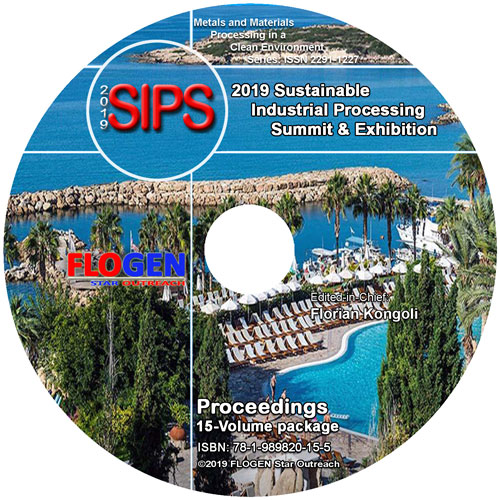2019-Sustainable Industrial Processing Summit
SIPS2019 Volume 11: New and Advanced Materials, Technologies, and Manufacturing
| Editors: | F. Kongoli, F. Marquis, N. Chikhradze, T. Prikhna |
| Publisher: | Flogen Star OUTREACH |
| Publication date: | 20 December 2019 |
| Pages: | 174 pages |
| ISBN: | 978-1-989820-10-0 |
| ISSN: | 2291-1227 (Metals and Materials Processing in a Clean Environment Series) |

CD shopping page
Present Status and Future Directions of Sustainable Machining
M. Helmi Attia1;1ADJ PROFESSOR, MECHANICAL ENGINEERING, MCGILL UNIVERSITY / NATIONAL RESEARCH COUNCIL CANADA (NRC), Montreal, Canada;
Type of Paper: Keynote
Id Paper: 164
Topic: 48
Abstract:
Manufacturing remains the largest and most important wealth generating sector. Within this sector, material removal is a key technology in the aerospace and automotive industries, contributing to more than $200 billion of the economy in North America on an annual basis. The demand for high productivity and high accuracy is steadily increasing, along with the increasing attention to the impact on the environment. In this work, only conventional machining processes are discussed.
A system approach to the machining system is presented in terms of its elements (machine, tool, workpiece and fixture), properties (materials, configuration, contact interfaces) and interactions (dynamic, tribological, thermal, thermo-elastic) to set the framework for predicting the system response (quality attributes and machining-induced defects) to the operational input. This input describes controlled cutting conditions and uncontrolled dynamic-tribo-thermo-elastic self-induced changes. The impacts of this new approach on the environment will be explored.
The paper provides a critical assessment of the current status of removal technologies of sustainable material. The paper also assesses the research effort towards the development of new and hybrid sustainable machining strategies and processes for: (a) high speed/high performance machining and tool life management, (b) machining of composites and stacked materials, (c) high performance/superabrasive advanced grinding and polishing, and (d) physics-based modeling and simulation of the machining system to achieve a virtual machining environment for the realization of sustainable development philosophy. Life cycle analyses of these technologies, which proved to be effective for applications that involve aggressive metal removal, especially for hard-to-cut materials, are discussed and compared to flood machining. They are compared in terms of their environmental impact on human health, ecosystem quality and natural resources (materials and energy). The effect of MQL and cryogenic machining on the surface integrity of machined surfaces and the reduction in cutting forces, surface roughness and tool wear are presented.
Keywords:
Composites; Environment; Metal removal processing; Surface engineering/Wear; Non-conventional techniques; Sustainable machining systems; Minimum quantity lubrication/cooling; Cryogenic machining; Environmental life cycle assessmentReferences:
1. Damir, A., Shi, B, and Attia, M. H., "Flow Characteristics of Optimized Hybrid Cryogenic-Minimum Quantity Lubrication Cooling in Machining of Aerospace Materials," accepted for publication in CIRP Annals - Manufacturing Technology, 2019.2. Shi, B., Elsayed, A., Damir, A., Attia, M. H., and Ma'Saoubi, R., "A Hybrid Modelling Approach for Characterization and Simulation of Cryogenic Machining of Ti-6Al4V Alloy," Trans. ASME, Journal of Manufacturing Science and Engineering, Vol. 141, p. 021021-1-8, 2019.
3. Jawahir, I.S., Attia, M. H., Biermann, D., Duflou, J., Klocke, F., Meyer, D., et al., "Cryogenic Manufacturing Processes," Keynote Paper, CIRP Annals - Manufacturing Technology, vol. 65, pp. 713-736, 2016.
4. Damir, A., Sadek, A., and Attia, M.H., "Characterization of Machinability and Environmental Impact of Cryogenic Turning of Ti-6Al-4V," Procedia CIRP, 69: p. 893-898, 2018.
5. Dam, A., Sadek, A., Attia, M. H., and Tendolkar, A., "Characterization and Optimization of Machinability and Environmental Impact of Machining of Ti-6Al-4V with Minimum Quantity Lubrication," International Journal of Robotics and Mechatronics, 4(1): p. 1-7, 2017.
6. Attia, M. H., "Sustainable Manufacturing: A Dilemma or Window of Opportunity?" 3rd International Symposium Aerospace Materials and Manufacturing, Montreal, Canada, 2006.